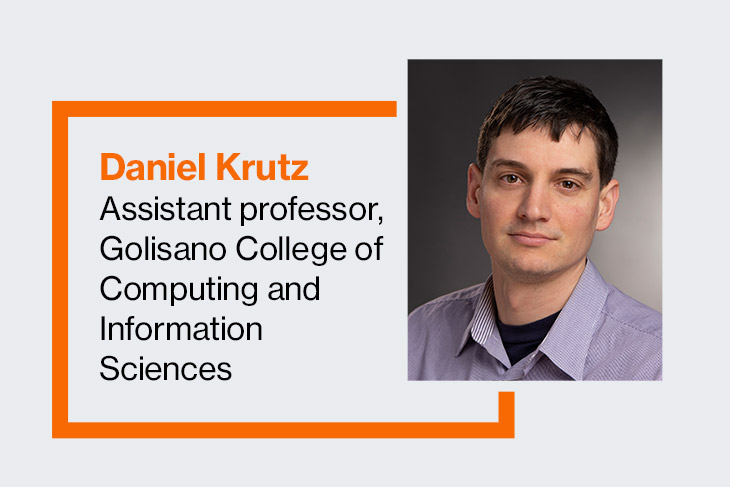RIT professor earns NSF CAREER Award to investigate empathy in computing education
Daniel Krutz and team of researchers develop labs for teaching accessible software development
Assistant professor Daniel Krutz received a NSF Faculty Early Career Development (CAREER) Award for pedagogical research to advance student understanding and motivation in experiential learning. The project will center on a series of labs that Krutz and a team of RIT student and faculty researchers are creating to teach how to make accessible software.
A team of faculty and student researchers at Rochester Institute of Technology are helping create a more accessibility-literate and empathetic software engineering workforce.
The researchers are developing free online lessons on how to create software that is accessible for those with visual, cognitive, hearing, dexterity, and other disabilities. The labs feature experiential learning and empathy-creating materials, in order to help learners understand the impact that inaccessible software can have on many users.
Daniel Krutz, an assistant professor of software engineering, has received a NSF Faculty Early Career Development (CAREER) Award for his work leading the accessibility project. His five-year grant, titled “Investigating the Use of Empathy-building Interventions in Experiential Computing Education,” will allow the team to continue developing labs and to study their pedagogical effects.
The project centers on the fact that about 15 percent of the population has a disability, but much of today’s software is inaccessible to them. In addition, there is a lack of educational material publically available for educators who want to include accessible software in their curricula.
“Although accessibility is a vital computing topic, it’s often excluded from formal undergraduate education,” said Krutz. “I wanted to reduce any barriers to teaching accessibility needs in computing and make it as easy as possible for resource-constrained educators. As software engineers, we need to make sure the things we create are accessible to everyone.”
Since 2018, Krutz and the RIT team have created five Accessible Learning Labs—varying from Accessibility with Screen Readers to Accessibility to Cognitive Impairments. The labs are free, available online, and can take about 30 minutes to complete. The labs cover different considerations with each accessibility issue, how to apply solutions to solve access problems, and exercises that bring the user through simulated problem scenarios.
“In a previous paper, we found that learning by doing and empathy help make students more interested and retain more knowledge,” said Krutz. “I know, personally, I learn best by doing. There hasn’t been a lot of research in this area of computing education, so that’s what we’re looking to investigate.”
For example, in one lab that explores accessibility issues involving color blindness, users must go through an exercise twice—once with a simulated color blind lens and once without. For Mark Sternefeld, a third-year software engineering student who helped develop the lab, the experience has made him more empathetic.
“When you actually experience how challenging and frustrating software or a game can be for people who are color blind, you experience the world from someone else’s point of view,” said Sternefeld, who is from Montague, N.J. “It’s easy to be oblivious, until you learn about it. This could be someone sitting next to me in class, but you just don’t know that they are going through these struggles.”
Heather Moses, a fourth-year software engineering student, is also working with the team to develop labs. The researchers interview and collaborate with people with disabilities to develop all the materials.
“As much as I’m creating awareness around accessibility, I’m also gaining just as much,” said Moses, who is from Richmond, Va. “Accessibility should not just be something you learn about quickly in class, these are real people.”
The Accessible Learning Labs have already been used as part of five classes at RIT so far and Krutz hopes they can be used by college institutions across the world.
The team has four more labs in development, including ones focused on artificial intelligence and machine learning, led by Samuel Malachowsky, senior lecturer of software engineering. The labs will explore testing AI for inadvertent biases and the ethical implications involved with AI.
The prestigious CAREER grant recognizes and supports junior faculty who exemplify the role of teacher-scholars through integrated research and educational activities. RIT has more than a dozen NSF CAREER award winners working at the university.
